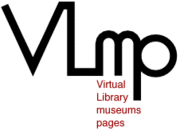Virtual Library museums pages facts for kids

VLmp logo
|
|
| Available in | English |
|---|---|
| Founded | 1994 |
| Headquarters | University of Oxford (in 1994), , |
| Area served | Worldwide |
| Created by | Jonathan Bowen et al. |
| Founder(s) | Jonathan Bowen |
| Industry | Museums |
| Services | Web directory |
| Parent | Virtual Library; International Council of Museums |
| Website | museums.fandom.com |
| Launched | 1994 |
| Current status | Hosted by MuseumsWiki |
The Virtual Library museums pages (VLmp) was an important early website. It was like a huge online list of museums from all over the world. You could use it to find museums that had their own websites.
Contents
History of VLmp
How VLmp Started
Jonathan Bowen created the VLmp online directory in 1994. It first started at the Oxford University Computing Laboratory in the United Kingdom. The website received support from the International Council of Museums (ICOM). It was also supported by Museophile Limited.
VLmp was part of the World Wide Web Virtual Library. This larger project was started by Tim Berners-Lee. He is famous for inventing the World Wide Web.
Where VLmp Lived Online
The main VLmp website moved to London South Bank University in the early 2000s. Today, it is hosted on a wiki called MuseumsWiki. MuseumsWiki was created in 2006. It is hosted by Fandom (which used to be called Wikia). This helps keep VLmp as a historical record.
Working Together Around the World
Many people from different countries helped build VLmp. About twenty people worked to keep various sections updated. They organized the directory by country.
- Canada was one of the first countries to join. The Canadian Heritage Information Network (CHIN) helped out.
- The MDA managed the United Kingdom section. Later, the Collections Trust took over.
- The Historisches Centrum Hagen in Germany hosted pages for museums there.
- Other countries like Romania also took part. In total, about 20 countries were involved.
Why VLmp Was Important
VLmp was very important for museums in the 1990s and 2000s. It was the main place people went to find museums online. It helped people see how many museums were getting online around the world. It was also used for studies about online museums. VLmp was a recommended learning tool. It even had a search feature to help users find what they needed.
Virtual Museum of Computing
What is VMoC?
The Virtual Museum of Computing (VMoC) was a special part of VLmp. It was a virtual museum itself. VMoC gave information about the history of computers. It also covered the history of computer science.
Inside VMoC
VMoC had virtual "galleries" that you could explore. For example, there was a gallery about Alan Turing. This section was put together by Andrew Hodges. VMoC also had links to other computer museums.
VMoC's Journey Online
VMoC started in 1995 at the University of Oxford. Like VLmp, it was hosted by the International Council of Museums (ICOM). VMoC was also hosted by the University of Reading. It was later hosted by London South Bank University. There were also mirror sites in other countries as part of VLmp. Museophile Limited also provided access to it. Later, VMoC became available as an archive on a wiki through Wikia.
VMoC in the News
Many well-known places reviewed VMoC in the 1990s. These included Discovery Channel and Lycos. It was also mentioned by Anbar Electronic Intelligence and Planet Science. RedOrbit and Science NetLinks also reviewed it. VMoC was even mentioned in books and papers. It also shared reports about events in computer history.
See also
- Library and Archival Exhibitions on the Web
- List of museums
- Virtual museum
- World Wide Web Virtual Library
 | Janet Taylor Pickett |
 | Synthia Saint James |
 | Howardena Pindell |
 | Faith Ringgold |

